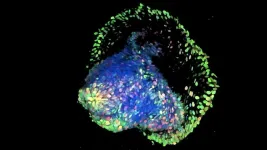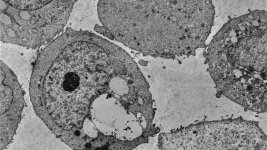(Press-News.org) Climate change is driving more extreme heat and more air pollution from wildfires, each of which put human health at risk. Now, new research funded by the federal Agency for Healthcare Research and Quality (AHRQ) and led by University of Maryland School of Public Health Professor Dr. Amir Sapkota, will study how these hazards independently and jointly impact already vulnerable groups, such as people living with end stage kidney disease (ESKD). The researchers aim to identify preventative solutions.
“During extreme heat, the damaged kidneys of people with ESKD do not regulate fluid levels very well, leading to electrolyte imbalances and other potential complications,” said Sapkota, chair of the UMD SPH Department of Epidemiology and Biostatistics and an expert on climate change and health.
“Most people can cool down by staying hydrated, but the liquid intake of a person with dialysis is strictly monitored and limited, so this is not an option.” Hemodialysis, or dialysis, filters waste and water from the blood, and requires multiple in-person treatments every week.
The study is being conducted in partnership with investigators from Renal Research Institute (RRI), Indiana University School of Public Health, UMD School of Medicine and colleagues within the UMD School of Public Health.
Researchers will analyze 25 years of U.S. electronic health records data from Fresenius Medical Care (FMC), the world’s largest provider of products and services for individuals with renal diseases, to understand how wildfire-related air pollution as well as extreme heat events can affect the risk of hospitalization and death among people living with ESKD. The study will consider how these risks vary for ESKD patients across climate regions, sociodemographic factors and other preexisting conditions.
Sapkota says the study will help identify patient populations most at risk of being hospitalized or dying during these compound hazard events.
“People with chronic kidney disease undergoing hemodialysis are a particularly vulnerable population due to the failure of their kidneys,” said Peter Kotanko, MD and RRI’s research director.
“As a result, they are predisposed to a range of comorbidities, notably cardiovascular disease, which heightens their susceptibility to the adverse effects of climate change, including heatwaves and wildfire-related air pollution.”
Recent evidence from the Intergovernmental Panel on Climate Change suggests extreme weather events are becoming more frequent, more intense and longer-lasting. Evidence generated from this new AHRQ-funded research could help to minimize the health burden of these extreme events among the 35 million Americans living with chronic kidney disease.
This research is funded under an AHRQ grant: R01HS029890.
To request an interview with Amir Sapkota, please reach out to sph-comm@umd.edu
END
University of Maryland researcher awarded $1.8 million to study climate change’s impact on people with kidney disease
Collaborative grant will examine how extreme weather events affect risk of hospitalization and death for people with chronic kidney disease
2024-10-24
ELSE PRESS RELEASES FROM THIS DATE:
Johns Hopkins Children’s Center research in mice suggests zinc supplements have potential value to directly treat short bowel syndrome
2024-10-24
Researchers from Johns Hopkins Children’s Center say they have identified a gene pathway involving the mineral zinc in mice that may someday point the way to using zinc-based supplements to directly help people with a rare disorder called short bowel syndrome (SBS).
The findings, published Oct. 7 in Nature Communications, help advance efforts toward more effective, potential treatment regimens for both children and adults with the debilitating condition.
SBS, which affects 10,000–20,000 adults and children in the United States, is marked by damage to and shortening of ...
Kalinin receives David Adler Lectureship Award
2024-10-24
Sergei Kalinin, a professor in the Department of Materials Science and Engineering, has been named the winner of the David Adler Lectureship Award in the Field of Materials Physics by the American Physical Society. The award recognizes one outstanding contributor in the field of materials physics who is notable for high-quality research, review articles, and lecturing.
“I am deeply honored to receive the Adler Award, as it recognizes the critical transition in materials discovery that my colleagues at the University of Tennessee and Pacific Northwest National Laboratory and I have championed,” ...
Evaluating the link between chemicals and declining insect populations
2024-10-24
Few people are fans of stink bugs, mosquitoes, or boll weevils, but insects play a key role in the circle of life that makes up the planet’s environment. In fact, world-renowned biologist E. O. Wilson famously declared that if insects vanished, our environment would collapse.
Scientists have noted that insect behaviour has been changing, and their populations are declining – on average 2-3% per year. This has prompted them to investigate the potential causes of this change, such as habitat loss due to overdevelopment, climate change, and chemical use.
EMBL researchers and collaborators recently investigated how pesticides, herbicides, ...
Scientists discover molecules that store much of the carbon in space
2024-10-24
A team led by researchers at MIT has discovered that a distant interstellar cloud contains an abundance of pyrene, a type of large, carbon-containing molecule known as a polycyclic aromatic hydrocarbon (PAH).
The discovery of pyrene in this far-off cloud, which is similar to the collection of dust and gas that eventually became our own solar system, suggests that pyrene may have been the source of much of the carbon in our solar system. That hypothesis is also supported by a recent finding that samples returned from the near-Earth asteroid Ryugu contain large quantities of pyrene.
“One of the big questions in ...
Sublethal agrochemical exposure disrupts insect behavior and long-term survivability
2024-10-24
Even at concentrations too low to kill, exposure to widely used agrochemicals – pesticides, herbicides, and fungicides, among others – has pervasive negative impacts on insect behavior and physiology, researchers report. The findings highlight the need for more comprehensive pesticide assessments, focusing not just on lethality but also on unintended long-term ecological harm to safeguard biodiversity. Over the past decade, many reports have highlighted alarming declines in insect ...
Understanding that US wildfires are becoming faster-moving is key to preparedness
2024-10-24
“The modern era of megafires is often defined based on wildfire size,” say Jennifer Balch and colleagues in a new study, “but it should be defined based on how fast fires grow and their consequent societal impacts.” Balch and colleagues report that wildfire growth rates in the U.S. have surged over 250% over the last 2 decades. Although these fast-moving infernos, or “fast fires” – those spreading more than 1,620 hectares in a day – account for only 2.7% of wildfire events from 2001 to 2020, researchers report that they are responsible for 89% of the total structures damaged ...
Model predicts PFAS occurrence in groundwater in the US
2024-10-24
According to a new machine learning-assisted predictive model, as many as 95 million Americans may rely on groundwater containing PFAS for their drinking water supplies before any treatment, researchers report. This raises concerns about unmonitored contamination in domestic and public water supplies. Per- and polyfluoroalkyl substances (PFAS), often called “forever chemicals,“ are highly persistent environmental contaminants linked to adverse environmental and health effects. Used in many consumer products, these organic pollutants have become ubiquitous in the environment and ...
By studying new species of tardigrade, researchers glean insights into radiation tolerance
2024-10-24
Tardigrades, eight-legged microorganisms colloquially known as “water bears,” are the most radiation-tolerant animals on Earth. Now, by studying a newly identified species of tardigrade, researchers have gleaned valuable insights into the animal’s ability to withstand radiation. These findings hold implications for safeguarding human health in extreme environments, such as spaceflight. Roughly 1,500 species of tardigrades have been described. These creatures can endure gamma radiation ...
Plastic chemical causes causes DNA breakage and chromosome defects in sex cells
2024-10-24
A new study conducted in roundworms finds that a common plastic ingredient causes breaks in DNA strands, resulting in egg cells with the wrong number of chromosomes. Monica Colaiácovo of Harvard Medical School led the study, which was published October 24 in the journal PLOS Genetics.
Benzyl butyl phthalate (BBP) is a chemical that makes plastic more flexible and durable, and is found in many consumer products, including food packaging, personal care products and children’s toys. Previous studies have shown that BBP interferes with ...
Vitamin K supplement slows prostate cancer in mice
2024-10-24
Prostate cancer is a quiet killer. In most men, it’s treatable. However, in some cases, it resists all known therapies and turns extremely deadly. A new discovery at Cold Spring Harbor Laboratory (CSHL) points to a potentially groundbreaking solution. CSHL Professor Lloyd Trotman’s lab has found that the pro-oxidant supplement menadione slows prostate cancer progression in mice. The supplement is a precursor to vitamin K, commonly found in leafy greens. The story begins more than two decades ago.
In 2001, the National Cancer Institute’s SELECT trial sought to determine if an antioxidant ...
LAST 30 PRESS RELEASES:
Scientists ID potential treatment for deadliest brain cancer
If you want to feel gratitude in your life, embrace nostalgia, VCU research finds
Malaria: Newly identified “crown” stage controls parasite reproduction
SwRI appoints Fuselier vice president of Space Science Division
What's the ROI on R&D in aging? New simulation tool, silverlingings.bio, explores geroscience's impact on US GDP growth and individual health
CFC replacements behind hundreds of thousands of tonnes of global ‘forever chemical’ pollution
Pigs and grizzlies, not monkeys, hold clues to youthful human skin
Innovative card deck by Case Western Reserve professor empowers kids to tackle stress head-on
From STEM to social impact: U-M scholars go global with Fulbright awards
Calling for young editorial board members
Blocking pain at the source: Hormone therapy rewires nerve signals in aging spines
Green chemistry: Friendly bacteria can unlock hidden metabolic pathways in plant cell cultures
NCCN commemorates World Cancer Day with new commitment to update patient resources
Uncommon names are increasing globally: Reflecting an increase in uniqueness-seeking and individualism
Windows into the past: Genetic analysis of Deep Maniot Greeks reveals a unique genetic time capsule in the Balkans
Researchers quantify role of reducing obesity in preventing common conditions
Sugar molecules point to a new weapon against drug-resistant bacteria
WHO calls for mental health to be central to neglected tropical disease care
Stacking the genetic deck: How some plant hybrids beat the odds
KRICT demonstrates 100kg per day sustainable aviation fuel production from landfill gas
High consumption of ultraprocessed foods may be linked to cancer survivors’ risk of death
Unsupervised strategies for naïve animals: New model of adaptive decision making inspired by baby chicks, turtles and insects
How cities primed spotted lanternflies to thrive in the US
UK polling clerks struggle to spot fake IDs, study reveals
How mindfulness can support GenAI use in transforming project management
Physical fitness of transgender and cisgender women is comparable, current evidence suggests
Duplicate medical records linked to 5-fold heightened risk of inpatient death
Air ambulance pre-hospital care may make surviving critical injury more likely
Significant gaps persist in regional UK access to 24/7 air ambulance services
Reproduction in space, an environment hostile to human biology
[Press-News.org] University of Maryland researcher awarded $1.8 million to study climate change’s impact on people with kidney diseaseCollaborative grant will examine how extreme weather events affect risk of hospitalization and death for people with chronic kidney disease




